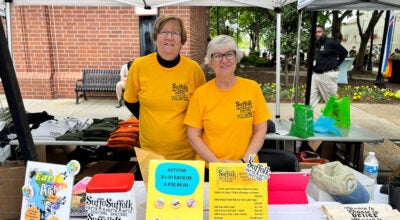General District Court brings new specialty docket to help mental health sufferers
Published 5:21 pm Thursday, February 23, 2023
|
Getting your Trinity Audio player ready...
|
Suffolk General District Court now offers a new specialty program to help those suffering from mental health issues who are charged with non-violent, low-level crimes.
Created by Judge Nicole A. Belote and Suffolk Assistant Public Defender Elisabeth N. Culpepper, the Western Tidewater Regional Behavioral Health Docket aims to help individuals who are repeatedly going through the legal system by “offering services to support and stabilize them” Belote said in a news release.
The docket has five phases where for a 12-month period, participants meet with case managers and treatment providers. Culpepper, who’s nearly decade-long public defender service includes Franklin, Southampton, Isle of Wight and five years in Suffolk, spoke about how the project got started.
“About two years ago, the 5th Judicial Circuit Drug Court started (another specialty docket) and I was approached by Judge Nicole A. Belote to work on the Behavioral Health Docket with her,” said Culpepper. “I built and secured multi-year funding for drug court and we were able to use what I had learned during that process to build the BHD.”
Noting how the project is one of only 17 such dockets in the Commonwealth, Culpepper explained how she applied for approval from the Supreme Court of Virginia to operate it beginning Feb. 15.
“I applied for funding from the City of Suffolk, which was generously granted, and I also applied for a grant from the Obici Healthcare Foundation to fund our project. The OHF granted us over $540,000 over the next three years,” she detailed.“On the first and third Wednesday of each month, our docket team will meet to discuss participants’ progress and then meet with the participants in open court to discuss how things are going. The docket team includes a clinician, case manager, community supervision officer, docket judge, and an attorney from the Commonwealth Attorney’s office and one from the Public Defender’s Office.”
Culpepper went to explain how in the criminal justice system, individuals suffering from mental health issues are charged with crimes stemming from their diagnoses.
“The classic example is someone who believes they own a local convenience store, so they enter the store and take a drink from the cooler. They’re not violent or dangerous, and those delusional beliefs are behind the ‘criminal activity,’” she said. “Until now the only option a judge has in many cases is a conviction and jail time, even if that time is often suspended. There aren’t treatment options and it creates a revolving door. Someone may spend 60 days in jail, unable to make bond, and once they are released they still don’t have access to medication management, counseling or other support services.”
Culpepper noted how more and more cases land in court when the real issue is mental health. She said the program will help those with mental health conditions who have been charged with low-level crimes.
“The docket includes wraparound services, which are provided for up to 12 months to participants. This can be case management, medication management, therapy and counseling, life skills classes, etc,” Culpepper said. “Participation is voluntary and the idea is to ensure people don’t slip through gaps in the system. Participants will have to complete a number of phases to graduate the program, and each phase has specific progress markers involved. Once they graduate, participants will have a solid network of care and the tools to help manage their own mental health needs and (hopefully) not circle back into the court system.”
Finally, Culpepper explained how specialty dockets such as this are science-led and evidence-based programs and provide help to the Suffolk community.
“They are heavily studied and we know that they work: reducing recidivism, reducing the rate of substance use, increasing the mental health and stability of participants,” she said. “It’s a program the entire community benefits from. Our neighborhoods are safer but more importantly, our neighbors and loved ones are able to access care and live healthy, stable lives.”
Mental health affects everyone, Culpepper said, adding if not in someone’s own immediate family, they have all had neighbors, friends or loved ones dealing with mental health struggles.
“Specialty dockets help remove the stigma of asking for help, they also reduce recidivism and show the community at large that these illnesses are manageable and people can safely remain in the community with proper care and support,” she said.






